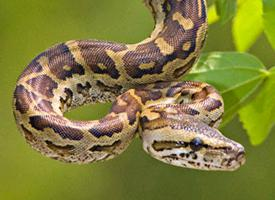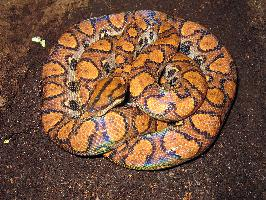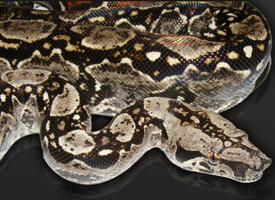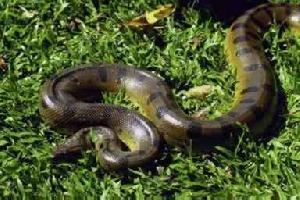
Weights and measures
| Length | from 3 to 7 m |
|---|---|
| Weight | from 50 to 100 kg |
Animal description
The Central African Rock Python (Python sebae) is a magnificent and formidable species of python, native to the central and western regions of the African continent. This species, one of the largest snakes in the world, showcases a remarkable blend of strength, beauty, and adaptability, thriving in a variety of habitats ranging from savannas and grasslands to forests and even near aquatic environments.Adult Central African Rock Pythons are imposing creatures, with average lengths ranging from 10 to 16 feet, although some individuals have been reported to exceed 20 feet in length. Their robust bodies are covered in beautifully patterned scales, predominantly a mix of brown, olive, and tan, with irregular black-edged blotches that provide excellent camouflage in their natural surroundings. This patterning not only blends seamlessly with the dappled light of forest floors and the sunbaked textures of rocky outcroppings but also serves as a deterrent to potential predators.
The diet of the Central African Rock Python is as varied as its habitat, consisting primarily of small to medium-sized mammals and birds. Larger specimens have been known to take down sizeable prey such as antelopes, demonstrating the python's incredible strength and the efficiency of its constriction technique. This method involves the snake coiling around its prey and tightening its grip with each breath the victim takes, ultimately leading to suffocation.
Reproduction in Python sebae involves oviparity, with females laying clutches of 20 to 100 eggs, depending on the size and age of the female. The mother exhibits a rare trait among snakes: maternal care. She guards the eggs and, through a process of shivering, can even slightly raise their temperature to ensure optimal incubation conditions. Once the hatchlings emerge, they are independent and receive no further care from the mother. These juvenile pythons are more vividly colored than adults and are at risk from a variety of predators, including birds of prey, crocodiles, and even other snakes.
Despite their fearsome reputation, Central African Rock Pythons are not typically aggressive toward humans unless provoked or threatened. However, due to their size and strength, they are respected and often avoided by people within their range. In some African cultures, these pythons are revered and considered to hold spiritual significance.
Conservation status of the Central African Rock Python is currently listed as Least Concern by the International Union for Conservation of Nature (IUCN), indicating that, for now, the species is not at immediate risk of extinction. However, habitat destruction, hunting for their skin and meat, and the pet trade pose ongoing threats. Conservation efforts are crucial to ensure the survival of this remarkable species, highlighting the importance of habitat preservation and the regulation of trade.
In summary, the Central African Rock Python is a species that commands respect and admiration. Its ability to adapt to various environments, combined with its impressive physical attributes and fascinating behaviors, make it a quintessential representative of Africa's rich biodiversity. As with all wildlife, understanding and respecting the natural role of this python is key to coexisting peacefully and ensuring its continued survival in the wild.
Similar Animals
New photos of animals
Top 10 animals
- Dolphin gull (Leucophaeus scoresbii)
- Diana monkey (Cercopithecus diana)
- Moustached guenon (Cercopithecus cephus)
- Galápagos tortoise (Geochelone nigra complex)
- Japanese macaque (Macaca fuscata)
- Stone loach (Barbatula barbatula)
- Russian tortoise (Testudo horsfieldii)
- Greek tortoise (Testudo graeca)
- Common flying dragon (Draco volans)
- Vendace (Coregonus albula)


